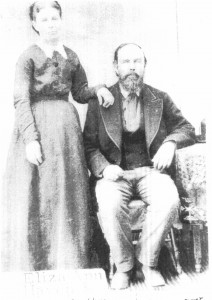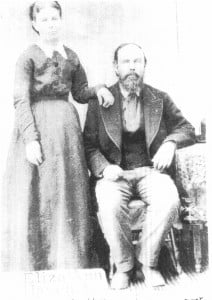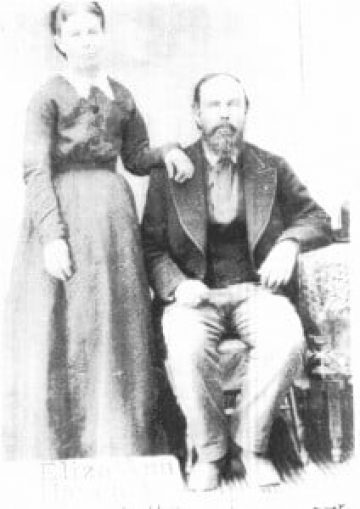
Eliza Ann Haven Westover was my grandma’s great-grandmother. For Christmas, Grandma sent me copies of some family letters and photos, including a letter Eliza Westover wrote to her son when she was 87 and “laid up” in a wheelchair, recovering from a broken hip. She wrote,
“I was born May 15, 1829 in Hollinston, Middlesex Co., Mass, the day our loved prophet Joseph Smith was baptized. The first Mormon elders I ever saw were President Brigham Young and Willard Richards. I was then eight years of age. In 1841 we left our native home for Nauvoo…
My son, I could tell you so many interesting things pertaining to our beloved prophet and his brother Hyrum, that I am unable to write for my strength will not permit. Bros. Joseph with the other brethren and a heavy guard marched past our home on their last ride. This scene I will never forget. When word came that our prophet and patriarch were killed, what a terrible gloom came over the whole city. Everyone was in tears, for we were a flock without a shepherd…
I was at the meeting when Sidney Rigdon arose and declared himself our true prophet and leader. Very few responded to his declaration. I am happy to say that not any of my father’s family felt he was the right one. Son, after Pres. Brigham Young came home from the east, where he had been on a mission, I was at the meeting when the mantle of brother Joseph encircled him and he said he was our prophet and seer. When he spoke, it was in Bro. Joseph’s voice. I arose to my feet and said to my mother: ‘Our prophet has come to life mother, we have seen Bro. Joseph back,’ for there he stood as plain as I ever saw him in life, and his voice and features were truly those of our beloved prophet. Shortly a mist seemed to pass from Bro. Brigham’s face and there stood Bro. Young talking in his natural voice, but we knew he was to be our leader. Hundred witnessed the same thing, but not all that were there had that privilege.”
Eliza was 15 at the time, and I imagine she was simply attending a meeting with her parents, not seeking for a vision. She doesn’t say anything about hoping for confirmation of who would be the next prophet, or even that she was sure there would be a next prophet. Her letter only says she was very sad about the martyrdoms. In the same way, Paul wasn’t seeking for any kind of affirmation about Christ on the road to Damascus, but received an overwhelming manifestation in spite of his state of mind. I’ve often wondered why some people have powerful experiences with the divine while I don’t, and it seems to me that such experiences are given very unevenly. Eliza noticed this, too, that not everyone in the room had the experience of seeing Brigham Young’s appearance transfigured. When I read her account I thought, nothing like this has ever happened to me or anyone I know (and I do very much view it as “happened to,” it wasn’t something she sought, it seemed to be an almost passive experience, like watching a play). But then I remembered that something a little like that did happen to me once.
In October 1994 I attended General Conference with a couple of my friends. I was 16, and waking up at 4 am to sit on a sidewalk wrapped in a blanket waiting to get in was fun and exciting (I was a very tame teenager). This was the conference when Howard W. Hunter was sustained as the prophet, and I was sitting on a narrow wooden bench in the balcony of the Tabernacle when he walked in to take his seat. Everyone stood up and started singing “We Thank Thee O God, for a Prophet,” and I believe I rolled my eyes at the singing, and didn’t want to stand up because I was tired. But I did stand up and join the singing, and as I watched President Hunter take his seat I had the clearest thought come to my mind that this man communicated with God. I knew it, as much as to know means to have confidence that one correctly apprehends reality. I had not been seeking for any affirmation about the Church or about prophets, I had no real issues to resolve, and I wasn’t expecting anything. And even though it was a subjective experience, and I’m aware now of possible non-miraculous explanations for my thoughts and feelings, the experience felt utterly real. It has sustained me at times when the leadership of the Church has said or done things that challenge my faith.
Now, the next-in-line to be prophet has said the same sex marriage exclusion policies are revelation from God. And I know the policies are morally wrong, as much as to know means to have confidence that one correctly apprehends reality. The knowledge is different from the kind I had in October 1994, it’s an accumulation rather than a sudden insight, but it’s real just the same. At some level it shouldn’t bother me that I reject this policy as revelation because the concept of prophetic fallibility isn’t new to me. But Elder Nelson didn’t leave room for ambiguity, he said the policies are revelation from God. I hear that, and I can’t believe it. This bothers me.
As I said, Eliza was 15 when Joseph Smith died. Two years later she was endowed in the Nauvoo temple. She left with her family for Winter Quarters in 1848, then left for Utah in Brigham Young’s company. “It was a large company. I had a very pleasant time, was young, blessed with good health and had no cares.” As it turns out, young people met and flirted with one another even on that hard journey. “It was on the plains that I first met your father, he drove one of Erastus Snow’s teams across the plains. The first time he saw me, I had one of father’s oxen by the horns, leading him up under the yoke.” When she arrived in Utah she worked with her mother making straw hats. “It was around this time Brother Brigham asked me to be his wife. I kindly told him ‘no’ I preferred a man of my own. On Oct. 14, 1849 I married a very wonderful man, Charles Westover, your father. We were the first couple married in Utah.” [1] (It seems Brigham had noticed her on the plains, too.) She and Charles settled in St. George, had 11 children, and were married for more than 70 years. She believed Joseph Smith was a prophet, and that Brigham Young was his true successor, but apparently that didn’t mean she accepted Brigham’s every word as God-given. Granted, Brother Brigham probably didn’t put his proposal in terms of prophetic revelation, but I’d like to think she would rejected it even if he had.
What is my point in telling Grandma Westover’s stories? Am I giving myself permission to reject the exclusion policies as revelation because she rejected Brigham Young? I’d reject the policies even if I didn’t know her story, so that’s not it. I guess my point is a question: what does it mean to believe in a prophet? Especially one who is alive at the same time you are. I think it’s a question of whether we can rely on the receptor and interpreter of spiritual truth – our hearts and minds. For my great-great grandma in Nauvoo, and for me in the Salt Lake Tabernacle, the reception of knowledge and the interpretation of it were relatively easy to accept because they were not controversial vis-a-vis the Church. In the case of my conclusion about the exclusion policies, I come to an unorthodox belief using my same heart and mind, the same receptor and interpreter, as came to the “right” belief about Howard W. Hunter’s prophetic calling. The receptor and interpreter are the same, but the alignment with the orthodoxy is not. But I think my heart and mind work at least as well as they did when I was 16, and I have to be able to trust them if I’m going to function as a full agent.
J. Reuben Clark famously said “We can tell when the speakers are ‘moved upon by the Holy Ghost’ when we, ourselves, are ‘moved upon by the Holy Ghost.'” [2] I remember reading Clark’s sermon as a college student and thinking, well, what if the Holy Ghost moves you differently and you don’t agree? What if your heart points another way, like Grandma Westover’s did? I think it’s worth noting that my experience, and Grandma Westover’s, were both relating to the calling of a prophet, not about something he said or did. When it comes to the prophetic statements at a granular level, we might not agree with some of them. And what if we don’t? This is such a moment. For me, the answer is turning out to be that I stay, and with as much charity as I can, I speak my truth.
[1] I wish I could report that she always had a man of her own, but 7 years later Charles Westover married Mary Eliza Shumway. They had 7 children. From census information in Family Search it looks like both wives lived in the tiny community of Pinto, Utah. Nowhere in the 4 page letter summarizing her life does Eliza Ann Haven Westover mention the existence of a second family. She did however write, “I have always been thankful for our wonderful family, that love, harmony and interest for one another always prevailed in our home.”
[2] When Are the Writings and Sermons of Church Leaders Entitled to the Claim of Scripture? Address to Seminary and Institute Personnel by President J. Reuben Clark, Jr. of the First Presidency. 7 July 1954.






14 Responses
Seems to me that she accepted things that were hard for her, such as a second wife. Maybe that means that she also understood her “receptor” might be broken, or that she might have an incomplete understanding. Sheer speculation on my part, but valid possibilities.
I wouldn’t say that she “accepted” polygamy because her husband married a second wife. When she chose to marry, she rejected marrying into a polygamous family and chose to marry a husband of her own. Seven years later, her husband chose polygamy, leaving her with only two options; to put up with it, like it or not, or to divorce him and become a single mother. Single motherhood is extremely difficult even today and single motherhood continues to be a great risk factor for poverty, and conditions were even worse for single mothers back then.
Interesting view. So you’re saying your ggg grandfather was an abusive lout who would have tossed her and the kids out of she didn’t accept a second wife? The letters and journals I’ve read from my women ancestors paint polygamy as a hard thing, but a blessing. I guess everyone has a different view. Even today. And about lots of things. Like following the prophet.
Exactly, April. There’s no evidence she “accepted” it. I doubt she had any real choice in the matter.
Humility is important, but I maintain that it’s not possible to function if we can’t trust ourselves to accurately receive truth.
I love this thoughtful post. I hear a lot of people say things like, “If you have faith that this man is a prophet, you have to believe everything he does is right.” Why should we have to believe that? I believe that God works through imperfect people. I respect them, I respect their callings, but I don’t stop thinking for myself.
Nor should you, or any of us. But the doctrine of the church on revelation is pretty clear. The 15 have spoken in unanimity. Scripturally that is an assurance that the will of the Lord has been revealed. Each of us now has to choose if we are on the Lord’s side, or if we are going to be in opposition.
Thank you for sharing your thoughts and Eliza’s story. There is so much nuance and complexity in belief.
Thank you for sharing your truth! I’d love a transcript of your grandmother rejecting BY.
Emily, thank you for your beautiful post. I loved this story so much. Your great great grandmother sounds like a remarkable woman. Thank you also for sharing your thoughts and questions about what it means to sustain our prophets and leaders. I can relate to your experiences. I think (and hope) that God expects us to grow by struggling with these kinds of questions.
I love this so much, “In the case of my conclusion about the exclusion policies, I come to an unorthodox belief using my same heart and mind, the same receptor and interpreter, as came to the “right” belief about Howard W. Hunter’s prophetic calling.”
I believe this to be true also and have come to more fully treasure those experience like your’s with President Hunter because it has been those experiences that have taught me to listen to the Spirit and gives me a small measure of comfort in the midst of a lot of feelings of discomfort when I hear the Spirit whisper an uncomfortable truth.
Hi, frequent reader but infrequent commenter. I appreciated this thoughtful piece. But what about people who get a witness from the Spirit that is different than ours? For example, I had a similar reaction as you as I read President Nelson’s remarks. But I know other people who have reported feeling incredible peace and a spiritual confirmation that this was true and of God. Really good, loving, spiritually in-tune people are receiving vastly different “witnesses from the Spirit”. I’m not sure what to do with that but it makes me pause.
Love this post, Emily.
I think we need to grant our prophetic leaders a lot of space to be human beings, do their best, and inevitably, mess up occasionally. I place this whole debacle of the last couple months regarding LGBT people and their children in the “mess up” category. And like you, I plan to speak my truth, as charitably as I can.
This is my great grandmother too and I have her history and I am having a hard time finding where she rejected BY???
Poppycock, Another twisted view on history meant to bend things to your personal view. I’m a Westover and know family history better than just about anyone. I’ve never heard the story of Eliza Ann having rejected Brigham. Ever. I like to see a source for that.
There is plenty of evidence that Eliza Ann was very close to Charles’ 2nd wife and other family. They lived together and that’s on record rather plainly.
It is easy from the cheap seats of living 150 years later to rationalize and editorialize how they lived. But the time was very different. Marriage was very different then. The fought for their survival and the code of the pioneers — and the experience of the Westover family — was that they depended upon each other mightily and had to start over frequently.
Charles and Eliza once had Brigham Young in their home for an overnight stay. This was years later, when they lived in Silver Reef. Of utmost concern in their mind was the validity of their temple sealing. They were married in the Endowment House, not a temple. This is what they wanted to ask Brigham.
He dismissed their care with a wave of his hand over a slice of pot roast. To them, what he had to said meant everything and yet to him it was not worthy of a second thought. Of course their sealing was of effect because it was done by the priesthood, not in a temple.
This is a telling story, on many levels, of what each of them, Brigham included, really believed and what they lived by.
You would be wise to reconsider your views. You are entitled to believe as you do and I respect that. But you’re misinterpreting what a prophet has said. Nobody is “excluded” in the gospel of Jesus Christ. But God operates by laws and even obeys natural laws. That’s why he is God. There is room in the church for those who claim to be gay. But don’t expect to dictate to God what marriage is. That’s up to God to define, not you or me.
Brigham knew that. So did your 4th great grandmother. It was the very promises of God-sanctioned marriage that she lived by. If you want to exclude yourself from that that is your choice. And you will have your reward.